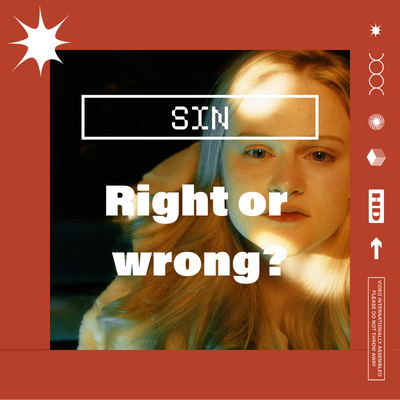
“Is it wrong to kill your dog and eat it?” A group of high school students hear this question posed in a psychology class and they’re predictably grossed out by it. Who would do such a thing, they wonder? But why do they all agree this would be wrong? By what standard or authority are they making their judgment? How do they know this shouldn’t happen–or that other things should or should not happen?
The answers to questions about sin and morality rest on value and purpose. On how things were made, and why. Christians believe this world and everything in it–including every person who has ever lived–has been created by God. He is the maker, the designer of it all. He brought everything that exists into being and has called it good. And the Bible tells us he created persons–men and women–in his own image. That means God literally looked to himself as the blueprint for mankind!
The God of Christianity is not a random, impersonal force who created stuff willy-nilly, or a super powerful being who made us and then left us to fend for ourselves. He is a morally perfect and loving being with the capacity and desire to interact with those he has made. His very nature is love, and he bestows that love on his creation. The fact that he made us gives us inherent value. The fact that he loves us gives us purpose and worth. We are to steward his creation in a manner that reflects his character, employing the attributes he has given us.
Any destruction, demeaning, devaluing, or misappropriating of what God has made, is sin. As creator, God defines what is right and what is wrong. The “maker” makes the rules. God has intentions for how everything should function–including us. In the same way that 2 + 2 equals 4 and not 5, something either is, or is not in line with God’s moral nature. And because we are made in his image, we have a moral nature too, and a sense of whether certain things are morally wrong or right. No one needs to tell us that genocide is wrong; that we shouldn’t take what belongs to someone else; that destroying God’s creation is not right. We’re aware of this, even though our moral nature has been affected by sin and is imperfect.
Consequences for sin or wrongdoing are woven into the fabric of creation, too. That is part of God’s design. That is why the Bible says “the wages of sin is death.”1 Moral failings lead to separation or estrangement from God, ourselves, others and creation itself, leaving us in need of God’s rescue, forgiveness and grace.
Psalm 19:7-9
“The law of the LORD is perfect,
refreshing the soul.
The statutes of the LORD are trustworthy,
making wise the simple.
The precepts of the LORD are right,
giving joy to the heart.
The commands of the LORD are radiant,
giving light to the eyes.
The fear of the LORD is pure, enduring forever.
The decrees of the LORD are firm,
and all of them are righteous.”
1 John 1:8-10 “If we claim to be without sin, we deceive ourselves and the truth is not in us. If we confess our sins, he is faithful and just and will forgive us our sins and purify us from all unrighteousness. If we claim we have not sinned, we make him out to be a liar and his word is not in us.”
Video Segment: (4:46 – 5:46) “When it comes to morality, why do we believe strongly that certain things are just wrong like cannibalism, rape, eating your dog – while others are right, like generosity, patience, and kindness? Interestingly, the idea of a universal moral code really only makes sense if a higher authority outside ourselves is the source of it. We are otherwise left with “opinions” that change based on the humans, cultures, and societies that come up with them. Christianity claims God is the standard, and that he gives the moral law for what is good. If the Bible isn’t true and there isn’t a God who made us in His image and told us to love our neighbors as ourselves, we have no basis for saying racism is wrong. We have no basis for saying babies shouldn’t be left outside to die. Because if there’s no God, these things are just our preferences and opinions. Humans aren’t the best candidates for determining what is right or wrong – but a never-changing, morally perfect, all-knowing, and loving God is.”
“Sin is a fundamental relationship; it is not wrong doing, it is wrong being, deliberate and emphatic independence of God.” ~ Oswald Chambers